103 Search Results for PODD
November 10, 2013
by Carole Zangari -
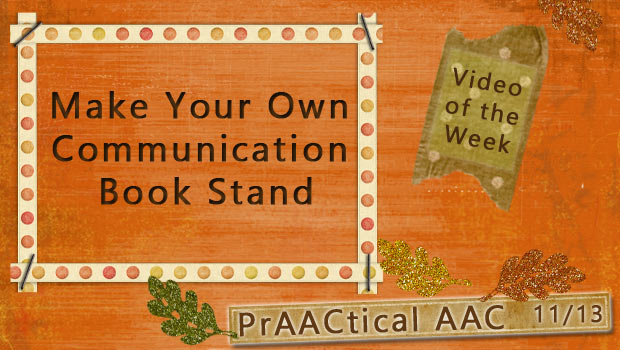
How can you make AAC learning easier with an empty binder and some duct tape? Stay tuned! Mary-Louise Bertram demonstrates how to make a portable stand for a PODD book, that could also work well for other kinds of communication books. Not only is this an inexpensive DIY solution, but one that allows you to use the book flat on the table or angled on the stand. Great for aided language input! We love the idea of repurposing for 3-ring binders, too. Here is the direct link, if you need it: https://www.youtube.com/watch?v=lJUKepEX4Xk
August 3, 2013
by Carole Zangari -
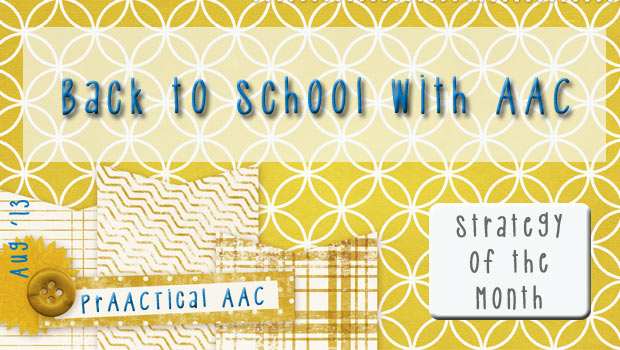
Here in the US, August is Back-to-School month. Throughout this month, we’ll try to post ideas and resources to help make the transition back to school a smooth and successful one. One of the most important things for students who use AAC is having their SLPs, teachers, and families on the same page. They each have a different but very intense relationship with the student’s AAC system. Here are some prAACtical thoughts on getting everyone on the same page. 1. Develop a communication profile of the student: In the initial weeks, try to get a baseline of how the student is communicating at the start of the year. For beginning communicators, we track things like their communicative intents (WHY they are communicating), modalities (HOW they are communicating), and the frequency of their communication. We’ve written about one of our favorite tools for this, the Communication Matrix. 2. Share what you know:... [Read More...]
August 1, 2013
by Carole Zangari -
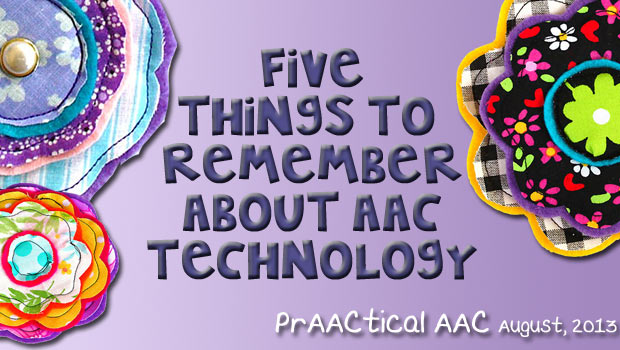
AAC technology is awesome. It really is. But it isn’t always ‘the answer.’ Here are a few things we try to keep in mind. 1. It’s not always the most efficient way for someone to communicate. Vocalizations, word approximations, gestures, and manual signs may be quicker and easier. 2. You always need a back-up. Another device, an app, a communication board, a PODD book, a print-out of the main SGD screens. Something. 3. It may not be the preferred means of communication with family and close friends. It’s not up to us to make that call. 4. The ‘latest thing’ isn’t always the best. Some of our prAACtical friends still lament the loss of the built-in printer on the Liberator. For them, the smaller, sleeker design of replacement devices weren’t worth the trade-off. 5. We generally don’t maximize the devices/apps we have. In some situations, there are useful features that... [Read More...]
May 23, 2013
by Carole Zangari -
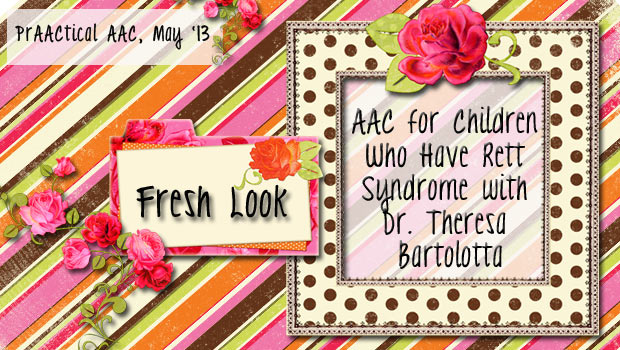
In our SLP training programs, few of us learned about Rett Syndrome or how to provide services to children with that disorder. We’re so pleased to have a guest post on AAC services for children with Rett by Dr. Theresa Bartolotta, Director of Assessment in the Office of the Provost, and Associate Professor in the Department of Speech-Language Pathology, at Seton Hall University, in South Orange, New Jersey. An SLP with over 30 years of clinical experience, she specializes in communication disorders in children with significant disabilities with a special interest in autism and Rett syndrome. Our field is still learning about Rett syndrome and we are still discovering new things about the range of skills and abilities present in the children who have it. In this post, Dr. Bartolotta gives us some background about the syndrome and discusses implications for treatment. I am thrilled to have this opportunity to post... [Read More...]
December 22, 2012
by Robin Parker -
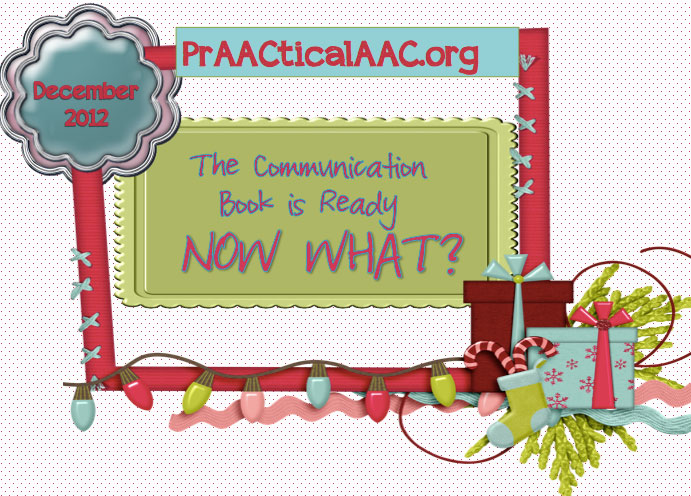
The Communication Book is Ready… Now What? The fun begins…. Yes, we really do think that TEACHING a learner to USE the communication book is FUN. We get to participate in lots of meaningful language experiences, we get to be creative, we get to watch language blossom, and we get to be surprised by the communication competence ALL of our learners show us after prAACtice, prAACtice, and for some more prAACtice . The best way to get started with communication book teaching is to begin by trying out different teaching tips, strategies, and resources and find out what works best. Each communication dyad (communicator & communication partner) is different so the combination of strategies that will work will vary but at the core of the teaching process, there should be fun, motivation, and of course progress. STRATEGIES and CONSIDERATIONS Aided Language Input (ALI)– We can not say enough about... [Read More...]
December 20, 2012
by Robin Parker -
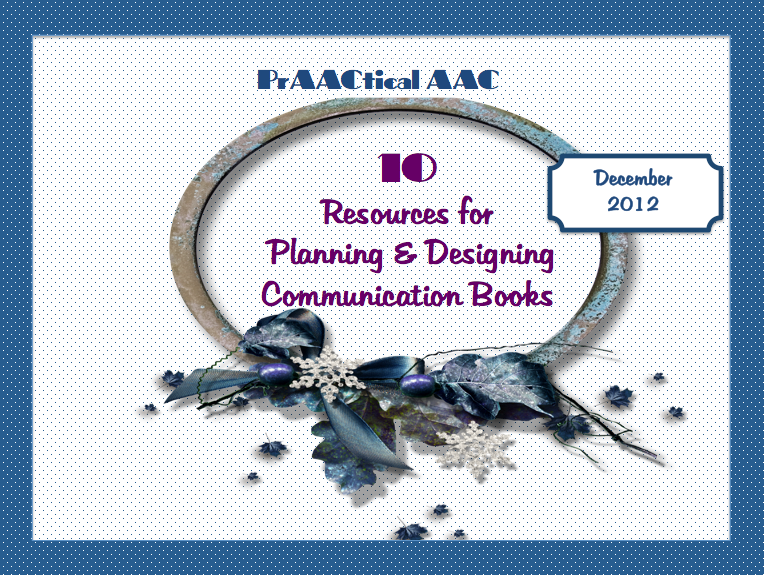
This post is dedicated to a mom who does more than her fair share for her child (who is now a young adult) as well as for our community. She recently began to re-design and re-assemble a communication book. She sent us this picture to show us that she was working on it. Here are some resources that will help make the task a little easier and more productive. PrAACtical AAC: Communication Books The PrAACtical Power of Communication Books Quick Start Communication Pages Communication Books- Making Decisions About Format Big Ideas on AAC Systems Directions and Diversions in the Design & Development of Communication Books Selecting and Organizing Vocabulary for AAC Users Communication Matters: Communication Books PODD Success After Initially “Not Getting It” Communication Starter Sets- PictureSET BC Communication Books- Baltimore Public Schools Oh yeah, and hopefully we can find a student who will do some work for community service... [Read More...]
December 8, 2012
by Robin Parker -
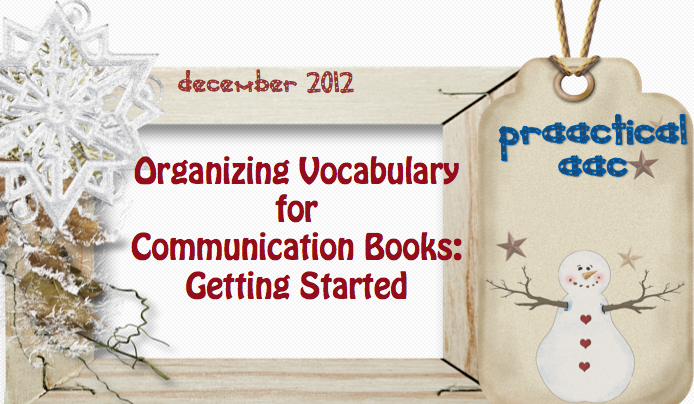
Organizing vocabulary on communication boards sometimes feels overwhelming, especially if you have not had specific training or education in this area. It is a huge responsibility because if the communicator can not navigate the communication book easily and quickly they might ‘lose’ motivation or ‘lose’ a listener. A problem that often occurs in ordering vocabulary for a communication book is that there appears to have been no plan. And when there are no plans, disorganization usually occurs and with disorganization comes chaos. So to avoid chaos, it is very helpful to make long term plan. Long Term Plan Considerations- A Beginning: Language Learning– it is often helpful to order vocabulary on a communication display so that the communicator can learn language and literacy in addition to functional communication. With this in mind, core and fringe vocabulary can be organized in a way that follows a left to right access to... [Read More...]
November 14, 2012
by Carole Zangari -
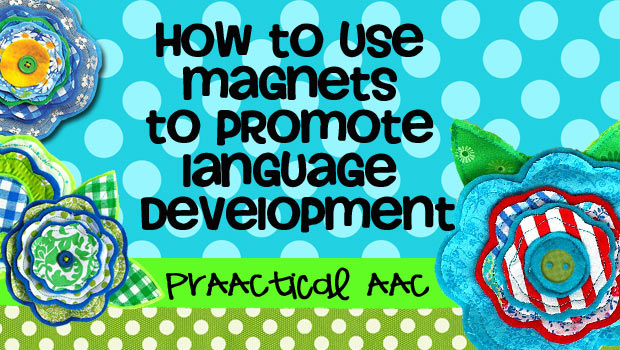
Want to help AAC learners accelerate their receptive vocabularies? Here’s one quick and easy step in the right direction: Talk to them. We’re not trying to be snarky here. The truth is that we speak less to people who are minimally verbal than we do to people who talk. In general, kids with AAC needs hear far less language than speaking children do. Fewer words heard means fewer opportunities to learn language. That’s a cycle worth breaking. When we’re around typically developing children, they’re always asking questions. “What’s in the bag, Mom?” “Why is she doing that?” “How come Billy gets to have one and I don’t?” “Where are we going?” “Are we there yet?” Kids ask lots of questions, particularly in the early years. Annoying? Sometimes. Valuable? Always. From a language learning perspective, those pesky questions serve a very useful purpose: they invite (or demand) a linguistic response. They... [Read More...]
November 7, 2012
by Carole Zangari -
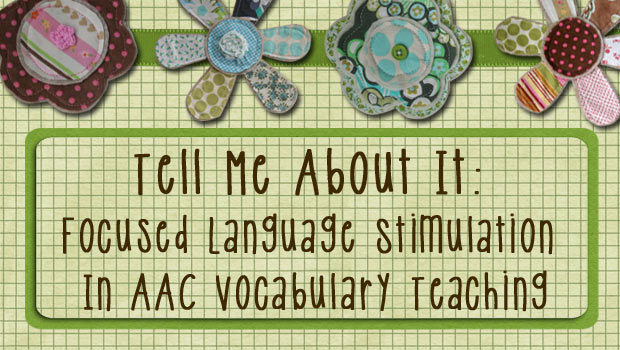
Earlier this month, we introduced a general sequence of how we conceptualize semantic instruction. We promised to elaborate on that. There are two things that I really love about this approach to to vocabulary teaching. The first is that is honors a principle that we know to be true: providing repetition with variety not only helps us reach learners with different strengths, but also gives our AAC learners much-needed practice. The other thing that makes this really work for us is that assessment has an active role but not a central one. Testing takes a backseat to teaching. As we all know, getting accurate assessment information from people who are learning their AAC systems is a huge challenge. Often, our AAC friends don’t have decent test-taking skills so we’re not really testing what we think we’re testing. Just last week I got to see Kristofer, an adorable little fellow who... [Read More...]
October 10, 2012
by Carole Zangari -
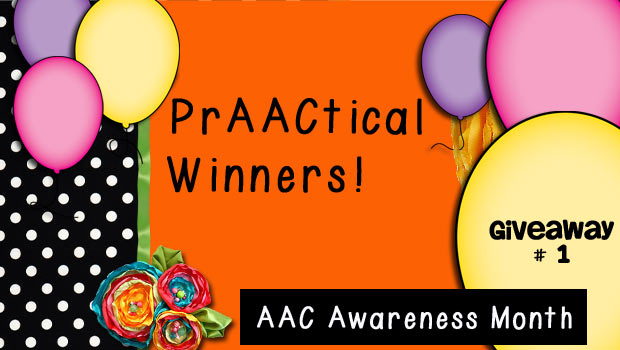
A full year of online CEUs AAC Notecards AAC Eval Genie App Practicing Unity Patterns App Set of PODD CDs Pillow Pet and Storybook 6 different RJ Cooper Apps 15 Codes for Alexicomm Apps We are so thrilled to be able to announce the first set of winners for our AAC Awareness Month Giveaway! This morning we used Rafflecopter to draw 12 names for prizes from Alexicom, Hump Software, RJ Cooper, Dynavox/Mayer Johnson, TapSpeak, Say It with Symbols, SpeechPathology[dot]com, and some from us. Congratulations to Karen McKenzie (#173), Susan Enders Fronek (#140), Leanne Talley Pool (# 65), Mary Behl (#195), Tea Moore (#88), Rebecca Kasdon (#27), Carly (#208), Kristy Davies (#491), Christina Frenzel (#36), Cassandra Stafford (#684), Juliana Escobar (#652), and Angela Bancker Larios (#710). We will be contacting you by email with the particulars later today. Winners, please take a moment to thank your prize donors. We’ll be posting... [Read More...]









